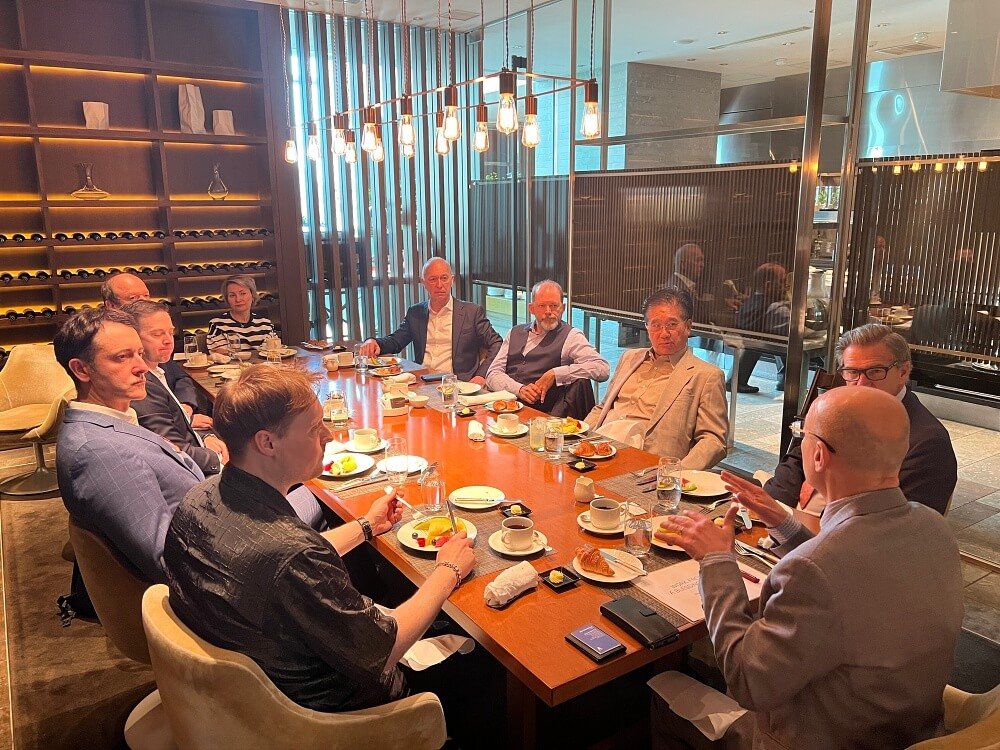The Delphi Roar: June 15th, 2025
Dear Members and Advisers,
I am struck by the fact that two of my French connections, CEOs at tech companies, have exited their roles, purely because the company has decided to leave Japan. One is Jean-Charles Cabelguen and the other is Remi Driancourt. Both are obviously very smart and highly qualified, which makes you wonder at the challenges they were confronting.
In any case, this fits in with the Robert Walters global CEO Tony Fowlston telling us at the 25th anniversary party last week, that he felt global business was pretty much in a slump. I also feel a “malaise” in Japan, and sympathize with the former Coca Cola member, Josh McCalden, who told me how sick he was of working in a shrinking market. However hard he worked, the best he could achieve was limiting the shrinkage!
I sometimes dream of following Tony’s advice and heading off to Riyadh or Dubai, where apparently vast sums of money, talent and technology are converging in what is either another huge bubble, or the start of an incredible period of growth for the region.
Seen in the Network
Upcoming Events
June 2025 Cocktails
Join us for our monthly cocktail party at the luxurious Andaz Hotel Toranomon Hills!
First-time Country Managers
A discussion for new country managers on mindset, bias, anxiety, and what truly matters in your crucial first year.
July 2025 Cocktails - Special Edition
Delphi Gathering to welcome a high-level group of elite Chinese and international students from CEIBS, a biz school co-founded and co-funded by the EU, during China’s golden era of rapid opening.
Heard in the Network
“I heard from a cyber security expert yesterday, who was very condescending about how easily we — ordinary people — get duped by hackers, phishers, and other online fraudsters. Initially, I felt quite ashamed. But then I thought that’s unfair: the whole point of the digital ecosystem is to make data abstract, flowing, transportable and replicable. In other words, the whole point of the system is to be able to access (or steal, mine, and manipulate) data. So the whole system is predicated on principles which make it intrinsically vulnerable to bad actors.”
“I have a tea business, and I was really struck by the difference between tea farmers in Japan and China. The Japanese tea farmers produce some of the world’s best teas, sometimes very rare, but they sell them at ridiculously low prices. They told me it was so that they did not offend the neighbours, who are used to buying tea at very cheap prices! In contrast, the Chinese are selling teas for tens of thousands of US dollars — and finding buyers without any problem.”
“I am a French artist in Japan, and I find it amazing how little art I sell here. I spend a lot of time outside of Japan to find buyers. It’s strange to say this in this environment (we were talking at the luxurious Andaz Hotel) but Tokyo, while looking rich, is poorer than these other cities: New York, Singapore and Shanghai. They have small houses and simply no wall space from which to hang stuff.”
“At first, WFH was granted as a benefit, but now people are taking it as a right, especially younger people.”
“WFH is especially easy to abuse by the people who are low performers anyway. They can fly even further under the radar.”
“The Japanese research into WFH was always a lot more critical than the English-language media, which tended to be very positive.”
“My Japanese colleagues at the top consulting companies I work with would be fired within a month if they worked in our New York office.”
“HQ is aware of this and sends gaijin to Tokyo to find out what is going on and raise the quality, but in prison parlance, they tend to get “shanked” (stabbed) one after the other on trumped-up charges of “powerhara”, etc. The atmosphere is poisoned and hyper-political. I have myself been accused of sex-hara by a colleague, acting under orders, from a Japanese partner. Unfortunately, the fools had not checked that I was abroad at the time.”
“Americans in Japan complain they cannot open a Japanese bank account, and blame the Japanese. But it’s purely because the US authorities impose such an appalling burden of regulation that the Japanese banks don’t want to touch a US customer. I don’t blame them!”
“I have seen a process where Japanese women staff are gradually degraded, their self-esteem destroyed, and then put under pressure to accuse an unpopular colleague of some spurious misdeed.”
“What Masa Son did with Silicon Valley via the $100 billion Vision Fund was actually amazing: an upstart Korean-Japanese wanted to take over the whole of Silicon Valley, which at the time was only worth $20 billion in total. He really had leadership, balls and vision (and Dan’s book review should have shown a little more respect!). ”
“The reason Son worked with so many Indians, rather than the Americans you might have expected, is that the Indians are currently at the top of the tech tree, which is at the top of global business.”
“I am Korean and I was married to a Japanese lady quite happily for a few years. Then she was elected to politics (with my help!) and got radicalized by those anti-Korean right-wingers who populate the “hinterland” of the Japanese political landscape. She turned against me, my parents and my kids. It was so disgusting I gave her 80% of my assets to leave as soon as possible, including several gold bars. Being a loser in all areas, not just politics, she sold the gold just before the huge rally, to invest in a restaurant. Inevitably, the restaurant failed after 18 months.”
“I get 200 emails per day. I just can’t keep up. I ignore them, figuring that anything really urgent will reach me by WhatsApp or text message.”
“People often see it as a contradiction, but granting “freedom” to your staff via WFH options requires a greatly accelerated amount of rules, regulations and communication. Freedom for individuals in how they work generates an enormous amount of complexity.”
“During Covid, our company had a disgraceful two-class system: white-collar workers could work from home, but plant workers had to show up every day. Not only that, they were ordered not to get sick. It created a lot of bad feeling in the company.”
“Not embracing WFH is primitive. The office was invented 100 years ago — it’s time to “individualize work” for each staff member, so that they can work in the most efficient and helpful way for themselves.”
“It’s significant that in Japan, Amazon and Suntory have both mandated an end to WFH.”
“My Japanese colleagues did nothing at Japan’s top universities and arrived at my firm completely unformed and useless. After scraping through a US MBA they joined the Japan elite and joined my firm, where they continue to display stunning mediocrity.”
“Whether on the client side or in my office, Japanese fight “globalization” tooth and nail, they are super territorial and aggressive, because they know they are not up to it.”
“My firm was advising clients, but at the same time, it had set up an investment fund which partners could invest in. There were no “Chinese Walls”, so there was lots of insider trading, and the firm made a huge amount of money, until the US regulator found and closed it. Amusingly, some partners are in their 70s and still working until midnight because they lost 50% of their money in the fund — and the rest through several divorces. These top, supposedly smart and capable guys are mostly broke!”
“Masayoshi Son was, at least some of the time, an amazing businessman. What he did with Yahoo Japan and Alibaba was very far-seeing, even if the insight was limited to the obvious fact (at least in retrospect) that globalization was essentially Americanization, and that all he had to do was bring US concepts and technology to Japan. ”
“I don’t see any end to foreign PE companies coming to Japan. There are thousands of good (not necessarily great) companies in the Japanese outback, lacking succession planning, and with a huge opportunity to raise their truly appalling productivity with some great tech — and just dirt cheap. And finally, they are willing to accept “dirty” PE money because they want to ensure their employees don’t lose their jobs.”
“After thirty years of marriage, my Japanese wife divorced me. I asked her if she had ever loved me, and she said “not for the last 26 years.” I wish she had told me earlier, but perhaps it was unwise to never ask!”
“My wife only divorced me after the kids were safe, well and graduated from college. I was quite impressed with her forward planning!”











